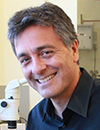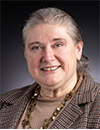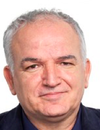| Conferences > Point-of-Care Diagnostics, Global Health & Biosensors 2020 > Keynote Speakers |
| Register | Login |
Chong AhnDistinguished University Research Professor, Mitchell P. Kartalia Chair Professor of BioMEMS, University of Cincinnati Dr Ahn is Distinguished University Research Professor and Mitchell P. Kartalia Endowed Chair Professor of BioMEMS in the Department of Electrical Engineering and Computer Science at the University of Cincinnati. He is currently Director of the Engineering Research Center (ERC) Clean Room and Ohio Center for Microfluidic Innovation (OCMI) at the University of Cincinnati. He has been recognized internationally as one of the pioneers in the Biosensors, BioMEMS, Microfluidics, Lab-on-a-Chips, and Point-of-Care Testing (POCT) clinical diagnostic fields. His research interests include the design, simulation, fabrication and characterization of BioMEMS devices, microfluidic device and systems, biosensors and biochips, lab-on-a-chips, in vitro diagnostics (IVD), and point-of-care testing clinical diagnostics or neurosurgical monitoring. He has published over ~350 journal and peer-reviewed conference proceeding papers, and chaired numerous international conferences and steering committees. He was invited as a plenary or keynote speaker from the prestigious international conferences such as uTAS, Eurosensors, APCOT, or IEEE IEDM. He served as one of the Scientific Advisory Board members of the Bill & Melinda Gates Foundation on microfluidics and point-of-care testing diagnostics in 2016. |
Nancy AllbrittonFrank and Julie Jungers Dean of the College of Engineering and Professor of Bioengineering, University of Washington in Seattle Nancy L. Allbritton is the Frank and Julie Jungers Dean of the College of Engineering and Professor of Bioengineering at the University of Washington in Seattle. |
Daniel ChiuA. Bruce Montgomery Professor of Chemistry, University of Washington Daniel T. Chiu is currently the A. Bruce Montgomery Professor Chemistry, Endowed Professor of Analytical Chemistry, and Professor of Bioengineering at the University of Washington. He is a member of the University of Washington’s Center for Nanotechnology, Neurobiology and Behavior Program, and the Cancer Consortium of the Fred Hutchinson Cancer Research Center. He has authored more than 180 publications and is the inventor on over 40 issued patents. Dr. Chiu obtained a B.A. in neurobiology and a B.S. in chemistry at the University of California, Berkeley in 1993, and a Ph.D. in chemistry from Stanford University in 1998. |
Albert FolchProfessor of Bioengineering, University of Washington Albert Folch’s lab works at the interface between microfluidics and cancer. He received both his BSc (1989) and PhD (1994) in Physics from the University of Barcelona (UB), Spain, in 1989. During his Ph.D. he was a visiting scientist from 1990–91 at the Lawrence Berkeley Lab working on AFM/STM under Dr. Miquel Salmeron. From 1994–1996, he was a postdoc at MIT developing MEMS under Martin Schmidt (EECS) and Mark Wrighton (Chemistry). In 1997, he joined Mehmet Toner’s lab as a postdoc at Harvard-MGH to apply soft lithography to tissue engineering. He has been at Seattle’s UW BioE since June 2000, where he is now a full Professor, accumulating over 12,000 citations. In 22 years, he has supervised 19 postdocs (16% of whom have reached faculty rank), 36 graduate students (12 Ph.D. students, 25% of whom faculty rank, and 24 M.S. students), and ~43 undergraduates. In 2001 he received an NSF Career Award, and in 2014 he was elected to the AIMBE College of Fellows (Class of 2015). He served on the Advisory Board of Lab on a Chip 2010-2016 and serves on the Editorial Board of Micromachines since 2019. In 2022 he was elected a member of the Institute for Catalan Studies, one of the highest honors bestowed on Catalan scientists. He is the author of 5 books (sole author), including Introduction to BioMEMS (2012, Taylor&Francis), a textbook adopted by >103 departments in 18 countries, and Hidden in Plain Sight (MIT Press, 2022). Since 2007, the lab runs a celebrated outreach art program called BAIT (Bringing Art Into Technology), which has produced seven exhibits, a popular resource gallery of >2,000 free images related to microfluidics and microfabrication, and a YouTube channel that plays microfluidic videos with music which accumulate ~163,000 visits since 2009. |
Amy HerrProfessor, University Of California Berkeley Amy E. Herr received a BS degree in Engineering & Applied Science from the California Institute of Technology and MS and PhD degrees from Stanford University in Mechanical Engineering. From 2002-2007, she was a staff member in the Biosystems Research Group at Sandia National Laboratories (Livermore, CA). Professor Herr has been recognized as: 2012 Young Innovator Award from Analytical Chemistry/CBMS, 2012 Ellen Weaver Award from the Association for Women in Science (AWIS, for mentoring), 2011 NSF CAREER award, 2010 NIH New Innovator Award, 2010 Alfred P. Sloan Research Fellowship in chemistry, 2010 New Investigator Award in Analytical Chemistry from Eli Lilly & Co., 2009 Defense Advanced Research Projects Agency (DARPA) Young Faculty Award, among others. Professor Herr has been formally recognized for her teaching & mentoring. Her research interests include bioinstrumentation innovation needed to advance quantitation in life sciences and clinical problems, in particular the study and application of electrokinetic phenomena in multi-stage, heterogeneous bioanalytical microsystems. |
Joany JackmanSenior Scientist, Technical Lead, Technology Development Core, Johns Hopkins Center for Point-of-Care Technologies Research for Sexually Transmitted Diseases, The Johns Hopkins University Applied Physics Laboratory Dr. Joany Jackman received her Ph.D in Cellular Biology and Molecular Biology from the University of Vermont and began her research career in the field of cancer biology at the NCI/NIH and Georgetown University before moving into the field of infectious diseases. She was an IPA at the USAMRIID assisting with DARPA programs geared to develop and test new diagnostics for biological warfare agents. As a senior scientist at the Johns Hopkins University - Applied Physics Lab, she has continued her research in the area of infectious diseases and diagnostics. Dr. Jackman received the patent for detection of biomarkers of infection in exhaled breath condensates. She has continued to work in these areas, infectious diseases and diagnostics as part of the Johns Hopkins Center for Point of Care Technologies for Sexually Transmitted Infections since 2007. |
Arben MerkoçiICREA Professor and Director of the Nanobioelectronics & Biosensors Group, Institut Català de Nanociencia i Nanotecnologia (ICN2), Barcelona Institute of Science and Technology (BIST) Arben Merkoçi is currently ICREA Professor and director of the Nanobioelectronics & Biosensors Group at Institut Català de Nanociencia i Nanotecnologia (ICN2), part of Barcelona Institute of Science and Technology (BIST). After his PhD (1991) at Tirana University (Albania), in the topic of Ion-Selective-Electrodes (ISEs) Dr. Merkoçi worked as postdoc and senior researcher/invited professor in the field of nanobiosensors and lab-on-a-chip technologies in Italy, Spain, USA and since 2006 at ICN2. Prof. Merkoçi research is focused on the design and application of cutting edge nanotechnology and nanoscience based cost/efficient biosensors. The paper/plastic-based nanobiosensors involve integration of biological molecules (DNA, antibodies, cells and enzymes) and other (bio)receptors with micro- and nanostructures/motors and applied in diagnostics, environmental monitoring or safety and security. He has published around 300 peer review research papers (H index: 61 WOS; 79 GS), supervised 30 PhD students and has been invited to give plenary lectures and keynote speeches in around 200 occasions in various countries. Prof. Merkoçi is Co-Editor In Chief of Biosensors and Bioelectronics and member of Editorial Board of other journals. He is co-founder of two spin-off companies, PaperDrop dedicated to nanodiagnostics and GraphenicaLab to electronic printing. See more details on his CV at: https://www.icrea.cat/security/files/researchers/files-maintenance/full_cv_amerkoci_0.pdf |
Anita RogacsHead of Life Sciences Strategy and R&D, HP Labs Dr. Anita Rogacs has done extensive work in the field of microfluidics, analytical chemistry, molecular biology, nanotechnology, plasmonics, and Raman spectroscopy, authoring over 30 publications. Anita received her M.S. and Ph.D in Mechanical Engineering from Stanford University, and has studied business at the Stanford Graduate School of Business. She is a National Science Foundation (NSF) and Sandia National Laboratories Fellow. After receiving her Ph.D., she joined HP’s CTO office and Labs, where she leads strategy and the technology development of a broad array of Life Sciences platforms. |
Joseph WangChair of Nanoengineering, SAIC Endowed Professor, Director at Center of Wearable Sensors, University of California-San Diego Professor Joseph Wang, is currently SAIC Endowed Chair and Distinguished Professor in the Department of Nanoengineering at University of California, San Diego. Previously, he was a Professor of the Department of Chemical Engineering at Arizona State University (ASU) and Director of Center for Bioelectronics and Biosensors at the Biodesign Institute. He obtained his higher education at the Technion and being awarded his D. Sc. in 1978. From 1978 to 1980 he served as a research associate at the University of Wisconsin (Madison) and joined New Mexico State University (NMSU) at 1980. From 2001-2004, he held a Regents Professorship and a Manasse Chair positions at NMSU. Since 1980, 20 Ph.D. candidates and 130 research associates and visiting scholars have studied with Professor Wang. |
Paul YagerProfessor, Department of Bioengineering, University of Washington Paul Yager is the Professor in the Department of Bioengineering at the University of Washington, Seattle. Professor Yager served as the The Hunter and Dorothy Simpson Endowed Chair, Department of Bioengineering from 2008-2013. Professor Yager's research focuses on microfluidics and its applications in global health. |




